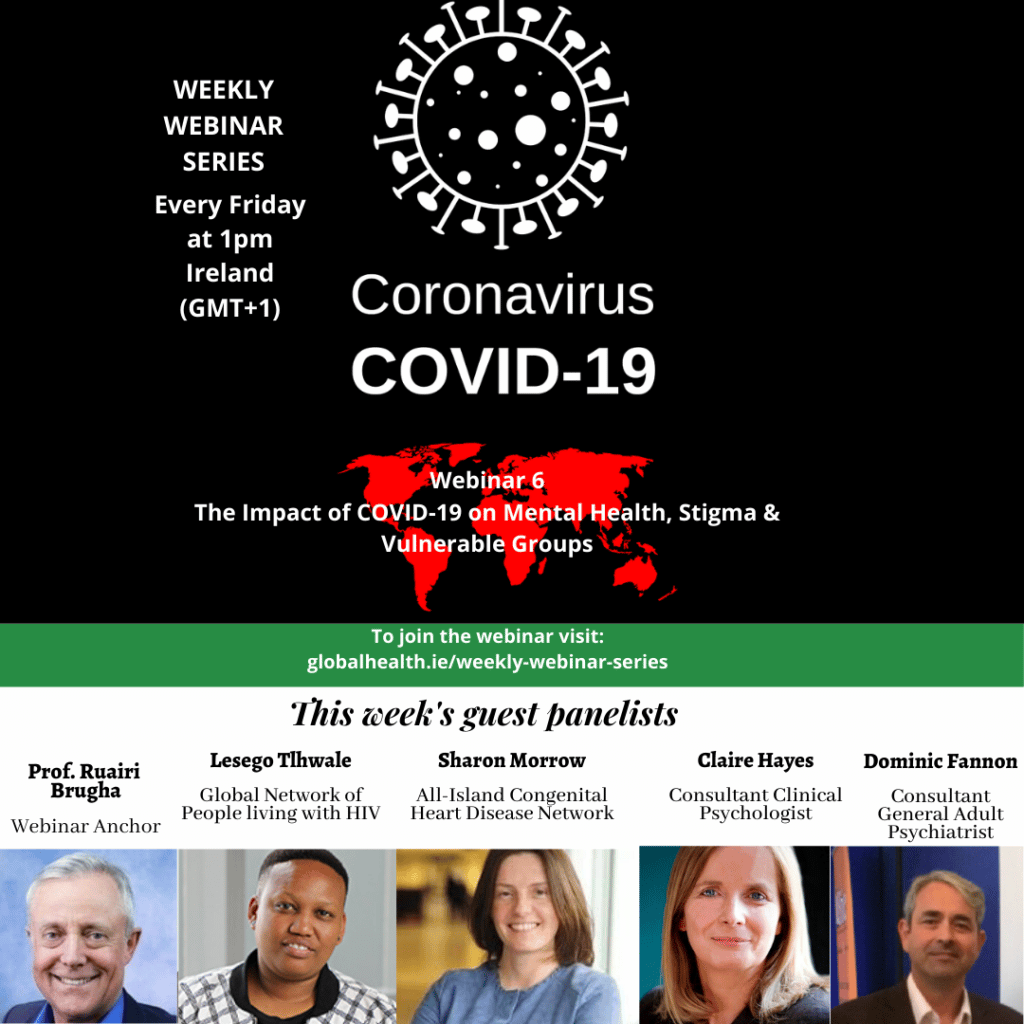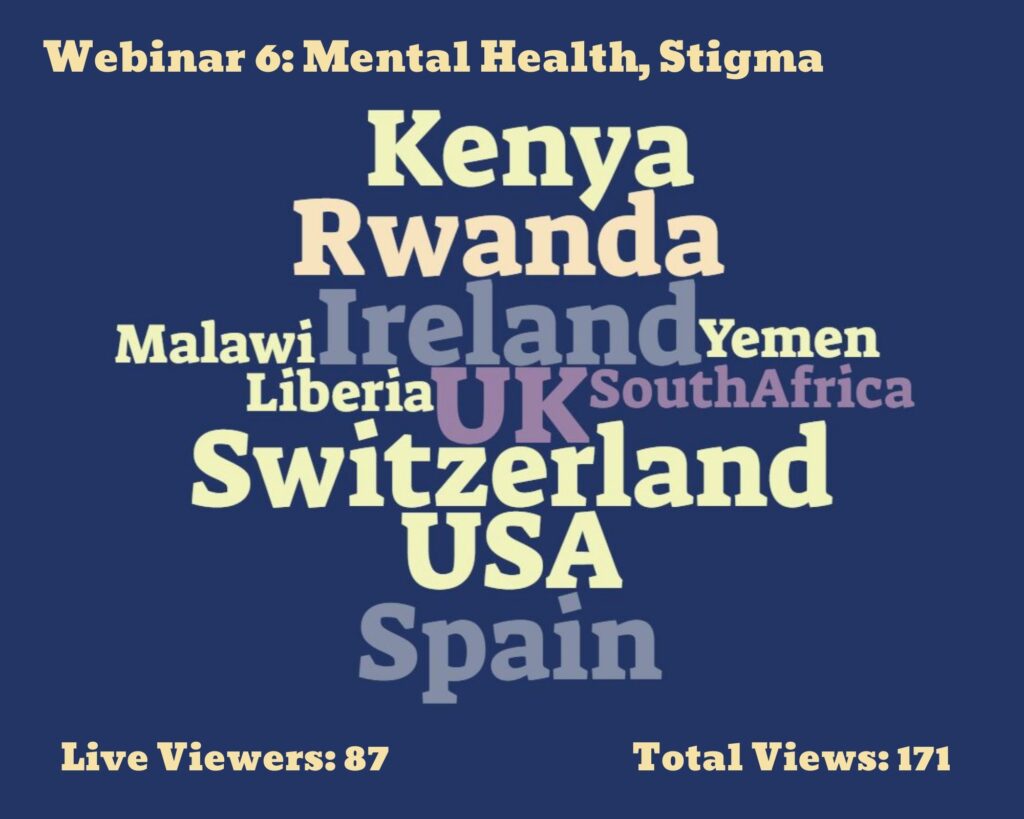Conversations on COVID-19 6th Webinar: The Impact of COVID-19 on Mental Health, Stigma and Vulnerable Groups
 WEBINAR SERIES: WEEK SIX The Impact of COVID-19 on Mental Health, Stigma & Vulnerable Groups
WEBINAR SERIES: WEEK SIX The Impact of COVID-19 on Mental Health, Stigma & Vulnerable Groups
The sixth webinar was held on Friday 24/04/2020 at 12:00 pm GMT/1PM Irish Time.
VIEW THE WEBINARCOMPLETE WEBINAR EVALUATION
A SUMMARY OF POINTS MADE
Sharon Morrow – Nurse, Night Site Manager for Tallaght General Hospital, Director at All-Island Congenital Heart Disease Network
Sharon described the front line of this pandemic on a daily basis. Tallaght Hospital has been busy, but have not seen the surge in patients expected, in part due to the diligent preparation done by the hospital.
Staff are put under more pressure due to further PPE regulations, continuous changing of staff due to testing/social isolation regulations, and are often tired/dehydrated. However, everyone is striving to stay as positive as possible.
She spoke about the mental challenges faced by staff eg. Loved ones being unable to see very sick family members, the mental toll of higher rates of death in hospitals etc. She also had suggestions for the sorts of mental health supports health workers might need – giving the example of “NOVID rooms” to relax and not speak about the pandemic.
Claire Hayes – Consultant Clinical Psychologist
Claire spoke to the biggest challenges for health workers, speaking about both external and internal demands on head space:
External: Patients & Staff frustrations and anxiety, increased PPE, Media etc.
Internal: Pressure we’re putting ourselves under, anxious thoughts, hopelessness etc. – these pressures are the ones that we can make efforts to address and balance.
Claire also provided tips for dealing with stress during this time: Acknowledging feelings & addressing negative thoughts in a healthy way, linking feelings to thoughts and focusing on what can actually be done, and choosing to seek support where possible.
To read Claire’s article in the Irish Independent on coping with anxiety during the COVID-19 pandemic, CLICK HERE
Dominic Fannon – Consultant psychiatrist, HSE senior consultant with ImROC ( a UK based not-for-profit recovery-oriented service and
practice improvement organisation)
Dr. Dominic is currently collaborating with mental health services in Gujarat, India, where (at time of recording) there are 23,000 cases, 720 deaths approx.
India typically has a weaker health system, relies mainly on agriculture, and has a high rate of internal migration – each of these has a negative impact on disease transmission. More testing, PPE, and trained personnel are needed.
Mental health affect of COVID-19 in India has already been seen: Impact on mentally stable people, impact on people with existing mental health difficulties (exacerbated by poverty etc) , and the impact on healthcare workers specifically. There has been a spike in both alcohol abuse and suicide, but largest impacts are seen by the most economically vulnerable groups, living in conditions where extra hygiene measures are not possible. Stigma is also emerging around the spread of the disease.
Dr. Dominic has published a document on Self-Care and Support for Healthcare Workers and their Managers in Dealing with COVID-19 in Low Resource Settings
Lesego Tlhwale – Media and Advocacy Officer, works with Global Network of People Living with HIV, South Africa.
Stigma is experienced daily by the most vulnerable groups: people who use drugs, sex workers, men who have sex with men etc. COVID-19 not only creates new stigma, but can effect the way of life of these highly vulnerable people. Sex workers are put at further risk while seeking work, those living with HIV face medication shortages, etc. – forces disclosures become a problem during lockdown. The stigma surrounding this virus is in many ways reminiscent of the HIV crisis and this stigma and misinformation has a detrimental effect on mental health. Education around these topics is vital.
GNP+ works practically by creating networks and communities within vulnerable groups in LMICs – these groups have in many cases begun to help their governments to disseminate accurate and effect information on HIV to the public. A Human Rights-based lens is used to ensure that stigma is reduced through these public information campaign. Vitally, members of these vulnerable communities take an active role in these endeavors.
GNP+ has created “Lessons learnt from the HIV response for COVID-19: Building community resilience”
Webinar Anchor: Ruairi Brugha, Professor Emeritus, Former Head of the Department of Public Health & Epidemiology at the Royal College of Surgeons in Ireland
View his COVID-19 stats summary here
Download Ruairi’s Powerpoint Presentation

CATEGORIES
- Restore Humanity Campaign
- Equity in Action Blog
- Training Programmes
- Sponsorship
- Vaccine Equity
- Get Global – Global Health Talks
- Student Outreach Team
- Get Global Young Professionals Talk Global Health
- Global Health Matters – Live Event Series
- Global Health Matters – IGHN Live Event Series
- An initiative of Irish Global Health Network
- ESTHER Ireland and ESTHER Alliance for Global Health Partnerships
- Global Health Matters – Webinar Series
- ESTHER
- IGHN Conferences
- Global Health Conference 2020
- Women in Global Health – Ireland Chapter
- ESTHER Partnerships
- Weekly Webinar Series
- 4th Global Forum on HRH
- Access to Medicines
- Archive Page Weekly COVID Webinars
- Clean Cooking 2019
- Climate Change and Health Conference 2017
- Conference Abstracts
- Conference Materials
- Covid FAQ
- COVID Funding Opportunities
- COVID-19
- COVID-19: Gender Resources
- Dashboard and online resources
- Education
- ESTHER Alliance
- Events
- Events & News
- Funding covid
- Global Health Exchange 2018
- Global Health Exchange 2019
- Global Health symposium 2019
- Health Workforce/HRH
- Homepage Featured
- Homepage recent posts
- IFGH 2011-2012 Conference and Events
- IFGH 2014 Conference
- IFGH Multimedia
- Irish AIDS Day 2017
- Irish News and Feeds
- Key Correspondent Articles
- Key Correspondent News
- Maternal Health
- Multimedia
- News
- News & Events
- Newsletter
- Opportunity
- Our LMIC's Resources for COVID19
- Partner Country News and Feeds
- Past Events
- Policy
- Presentations
- Recurring events
- Reports & Publications
- Research
- Resources
- Student Outreach Group
- Students Corner
- TEDTalks
- TRAINING COURSES FOR HEALTH CARE PROFESSIONALS
- Uncategorized
- Upcoming Events
RECENT POSTS

Impact testimonies- Lombani

Impact Testimony – Shadrick

Power, Inequality, Decolonisation – and Living My Recovery By Bronwyn April

Global Health Without Borders: Reflections on the Power of Diverse Voices

IGHNxEU – Empowering Women for a Healthier Europe

